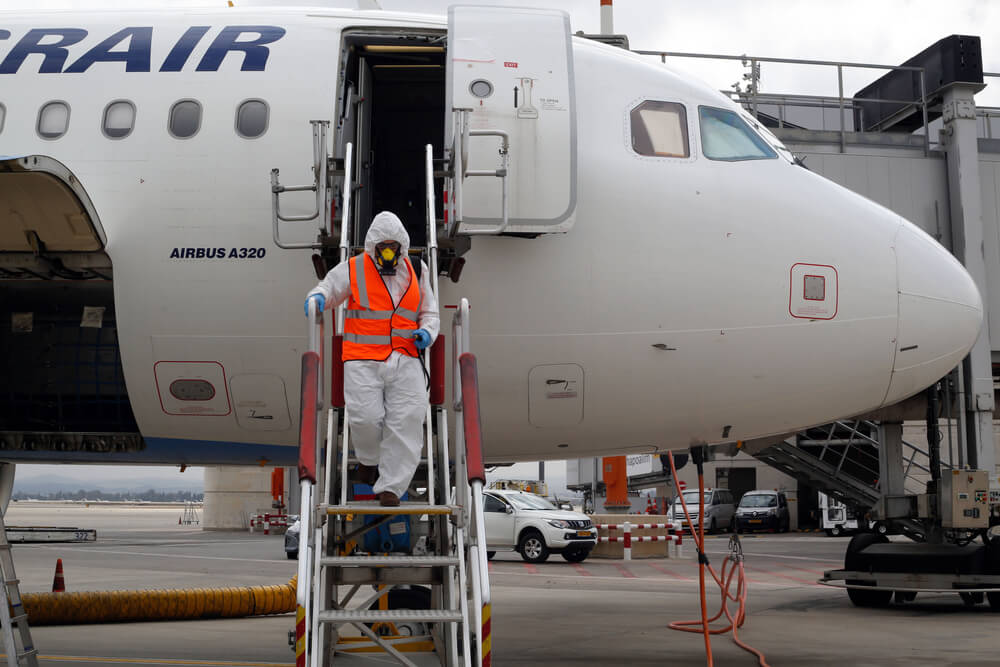Quick turnaround times were one of the main ways for low-cost carriers to increase their revenue potential, as they squeezed in as many flights per day as they possibly could. However, with the current pandemic and requirements by various regulators to disinfect aircraft regularly, that might change.
For example, the European Union Aviation Safety Agency (EASA) issued two safety directives (SD) to airlines registered in the European Union (EU) and to operators based outside of the EU that operate flights from and to the union. SD 2020-03 and SD 2020-04 were issued with the goal to “minimize the risk of transmission of the COVID-19 infection” to people on board the aircraft from potentially contaminated surfaces.
Both SD’s require airlines to disinfect their aircraft at least once in a 24-hour interval, including before every long-haul flight and after an aircraft has returned from a long-haul itinerary and is set to fly for another trip shortly after.
Disinfecting aircraft could take a long time and, in turn, increase the total turnaround time at an airport. For example, airBaltic chief executive officer (CEO) Martin Gauss stated during FIA Connect 2020 that the airline now has a “minimum turnaround time of 60 minutes” to disinfect the aircraft.
“Utilization is nowhere it should be,” added Gauss. While technically the airline is currently flying with 16 aircraft, in practice the number has dropped down to 11 due to disinfection practices alone. “That is one of the prices you have to pay,” remarked the executive.
The Latvia-based airline averaged 8.76 block hours per aircraft per day in 2019, stated its financial report for the year. Taking out a full hour of operations per day, already in a situation where airlines have limited opportunities to grab revenue due to the limited nature of operations as a result of the current COVID-19 pandemic.
Reduced utilization
Seemingly, the decision to disinfect aircraft after every flight is on every airline’s shoulders and their concern for passenger confidence. After all, EASA’s safety directives mandate that an airliner must be disinfected every 24 hours if it flies itineraries that are less than six hours, unlike in the case of a long-haul flight, whereupon the aircraft must be disinfected after every journey.
“Unavoidably, the additional processes and procedures introduced to safeguard passengers safety will take a toll on the Ground Operations models previously in place,” stated Enzo Zangrilli, a senior aviation consultant at 1Aviation. “The 25-minute Turnaround time, a standard industry performance target adopted mainly by LCCs will be in the interim impossible to achieve,” added Zangrilli.
While Zangrilli did note that low-cost carriers will be the ones to suffer the most, history showcases that their business model allows for more flexibility and its more than likely that they will come out of the crisis much sooner than their legacy counterparts.
Wizz Air noted in its FY2020 report that the company “further reduced its expected capacity utilization for the 2021 financial year.” The Hungary-based airline did not indicate whether the reason was increased disinfection of its aircraft on a turnaround.
AeroTime News approached Wizz Air for comment.
Ryanair, for one, disinfects its aircraft only on a daily basis. According to the airline’s chief executive Michael O’Leary, “you don’t have the staff or supplies at airports to disinfect on turnaround,” he said in an interview with The Times. On the other hand, KLM’s turnaround times were hardly influenced by the health and hygiene measures as a result of the COVID-19 pandemic, the Dutch carrier’s spokesperson Marjan Rozemeijer told AeroTime News.
The disinfection of an Airbus A320 family aircraft, for example, could take up as much as an hour and a half, according to Tomas Vysniauskas, Head of Ramp Services department at Baltic Ground Services (BGS). The time, however, depends on how many people are doing the job and whether the company wants to disinfect its baggage compartment, for instance.
Naturally, employing more people to turn the aircraft around faster would come at a cost, which would impact the price of the ticket. With passenger confidence in flying in peril already, the low-cost model of cramming as many people as possible without proper disinfection marketed to travelers might put second thoughts in the minds of consumers when picking and choosing airlines.
